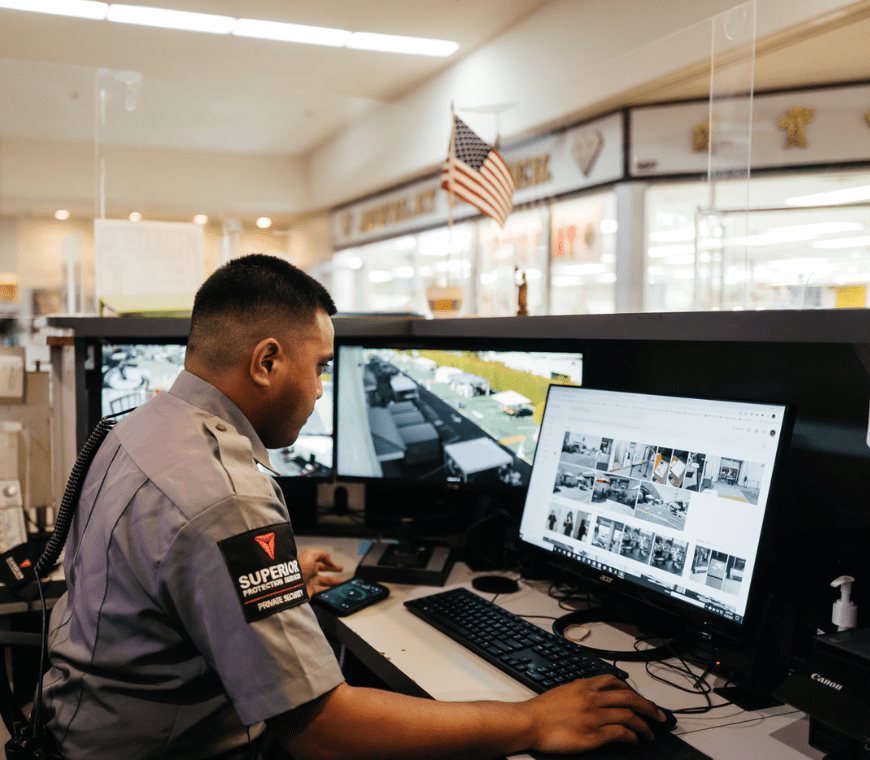As security threats continue to evolve, business & property owners must decide on the best way to protect their assets, employees, and customers. Two primary options stand out: hiring professional security guards or investing in advanced surveillance systems. While both provide essential security benefits, each has its strengths and limitations. The right choice depends on your property’s specific needs, level of risk, and budget.
This guide compares security guards and surveillance systems, helping you determine the most effective solution for your business or property in 2025.
1. The Role of Security Guards in Property Protection
Security guards offer a human presence that technology alone cannot replicate. They provide real-time responses to security threats, deter criminal activity, and offer assistance in emergencies.
Advantages of Security Guards:
- Immediate Response: Unlike surveillance cameras that only record incidents, security guards can take immediate action to prevent crimes.
- De-Escalation of Conflicts: Trained personnel can manage confrontations, prevent violence, and control tense situations.
- Customer and Employee Safety: Guards provide a sense of security, helping customers and employees feel safe.
- Customized Security Solutions: Security teams adapt to specific property needs, from access control to emergency response.
Limitations of Security Guards:
- Higher Cost: Employing security guards requires ongoing wages, benefits, and training.
- Limited Surveillance Coverage: Guards can only be in one place at a time, making it harder to monitor multiple areas simultaneously.
2. The Effectiveness of Surveillance Systems
Modern surveillance systems have become highly advanced, using AI-driven analytics, remote monitoring, and automated alerts to enhance security.
Advantages of Surveillance Systems:
- 24/7 Monitoring: Unlike security guards, cameras provide continuous surveillance without breaks.
- Recorded Evidence: Video footage can be used for investigations and legal proceedings.
- Lower Long-Term Costs: Once installed, surveillance systems require minimal maintenance compared to ongoing security personnel expenses.
- Wide-Area Coverage: Multiple cameras can monitor different locations simultaneously, reducing blind spots.
Limitations of Surveillance Systems:
- No Immediate Intervention: Cameras can only record crimes, not stop them in real time.
- Dependence on Power and Connectivity: System failures or hacking risks could compromise security.
- Lack of Physical Presence: The absence of human deterrence may embolden criminals.
3. Which Security Solution Is More Effective?
The effectiveness of security guards versus surveillance systems depends on the type of property, level of risk, and security needs.
Best for Businesses with High Foot Traffic:
If your property experiences a high volume of customers or visitors, security guards offer a personal touch that cameras cannot. Retail stores, hotels, and event venues benefit from having guards to manage crowds and prevent theft.
Best for Large or Multi-Site Properties:
For warehouses, corporate offices, and apartment complexes, surveillance systems provide extensive coverage and cost-effective monitoring. Remote access and automated alerts allow security teams to monitor multiple sites efficiently.
Best for High-Risk Environments:
Properties handling valuable assets, such as banks or jewelry stores, require a combination of security guards and surveillance systems. Guards offer immediate response, while cameras provide crucial documentation for investigations.
4. The Best Approach: Combining Security Guards and Surveillance Systems
Rather than choosing between the two, many businesses and property owners benefit from integrating security guards with surveillance technology.
- Guards and Surveillance Working Together: Live monitoring of security cameras allows guards to respond to threats faster.
- Remote Access with On-Site Support: Surveillance systems enable remote monitoring, while guards provide physical intervention when needed.
- Cost-Effective Hybrid Solutions: Businesses can reduce costs by using security cameras for 24/7 monitoring while employing guards during high-risk hours.
Final Thoughts: Choosing the Right Security for 2025
Both security guards and surveillance systems play essential roles in property protection. While guards provide real-time responses and human intervention, surveillance systems offer continuous monitoring and valuable evidence collection. The best approach often involves combining both for maximum security.
